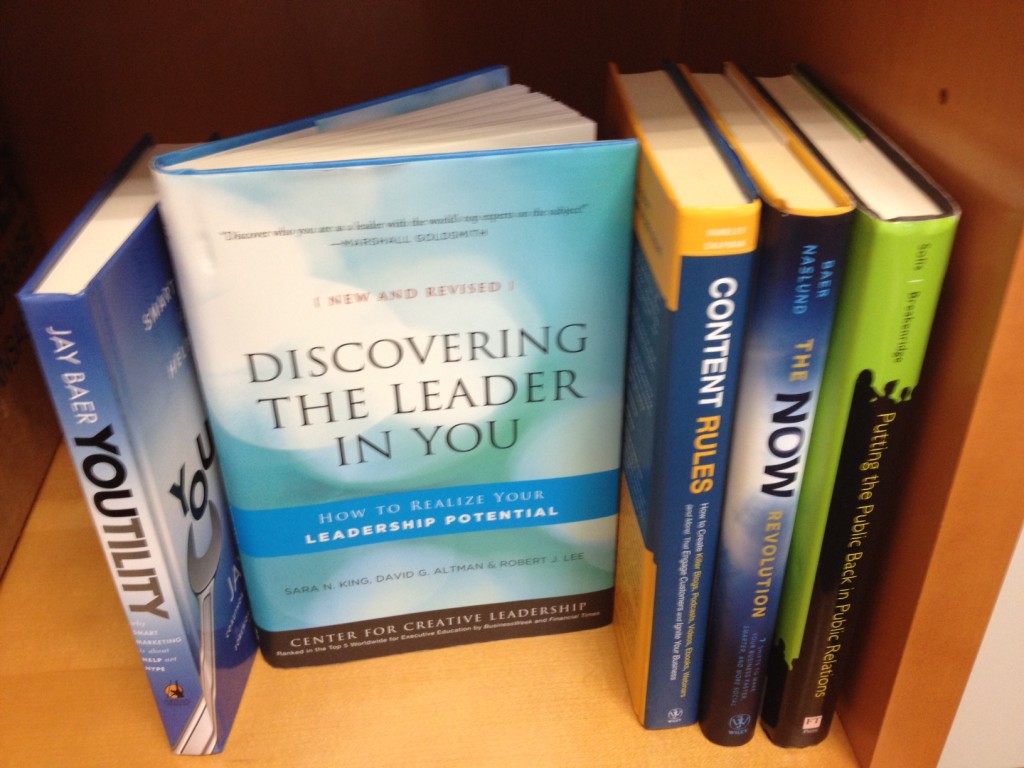I’ve written and re-written this intro at least three times. Today’s post is by Justin Goldsborough, and I’m having a hard time coming up with an introduction that does him justice. I could tell you about his penchant for bad puns, or his (sometimes questionable!) loyalty to the Kansas City Royals. But, I could also tell you about the time we were at SXSW and Justin wouldn’t let me wander the streets myself in search of a cab by. Or, I could tell you about the many, many conversations we had about the future of digital PR when we were co-moderating PR 2.0 Chat. Suffice it to say, Justin is one of my favorite people, and, note to self, someone I need to spend more time reconnecting with in 2014.
•••
Post by: Justin Goldsborough
There are certain things in life we think we should know. For instance, if I go ask 10 people what makes a good leader, all 10 are going to give me an answer they truly believe. But will those answers be right?
It’s weird how this mental block that we should know the answer sometimes keeps us from finding the truth. It happened to me with leadership. Until I read Discovering the Leader in You, a book written by three members of the Center for Creative Leadership (CCL). A good chunk of what I thought I knew about leadership was incorrect, or at least misguided. Good thing I had to read the book for a class or I might still be missing the point.
Below are three key tenants of leadership I learned from the CCL book that changed the way I think about leadership. Before you read any further, write down what you think three key tenants of leadership would be. Then compare them to the list below. How many were the same?
1. Good leaders do NOT work 80 hours a week
In fact, most don’t work 60 hours. Have you ever compared the amount of hours you work with a colleague or a competitor? Do you talk about the amount of time you spend working as a badge of honor? Do you think you have to work harder and longer than everyone else in order to be a great leader?
You may be surprised to learn that some of the best leaders in corporate America only work between 40-50 hours a week. The CCL has done research that shows:
- Managers and leaders who maintain good roles outside work (e.g. family, community) often perform better on the job than those who maniacally work, work, work.
- There is a strong correlation between health and leadership effectiveness. Senior execs who exercised were rated significantly higher on overall leadership effectiveness than their non-exercising peers.
Again, this is not the opinion of the author, but the results of research. So if you are putting in tons of hours and burning the midnight oil instead of burning calories, maybe you should rethink your approach.
2. Good leaders do NOT always know the answer
Show me a leader who always makes decisions on his own and I’ll show you an ineffective leader. CCL notes that the best leaders have two things in common when it comes to making decisions: 1) They have experienced drift, which means having doubts about their capabilities and 2) They have used their “personal board of directors” and the colleagues around them to help them through those tough decisions.
I have worked with two types of executives in my career:
- Those who thought they needed to make every call; some people call these execs micromanagers
- Those who attempted to hire smart people around them and frequently asked for advice from them or their peers
If you work for the first kind of exec, start looking for a new job. You’re opportunities for success will be limited because these types of leaders are too worried about showing what they think is a sign of weakness, even when it could help the company. In fact, CCL researchers have found, “many senior executives try to maintain a powerful facade when revealing their personality and humanness is a better sign of effective leadership.”
If you work for the second kind of exec, learn as much as you can both from her leadership style and the opportunities you’ll get being part of an empowered workforce. And create your own personal board of directors. CCL actually advocates for leadership networking: “These relationships allow you to share resources and to build up credits with people you can cash in when your team needs help.”
To quote Jack Welch: “Before you are a leader, success is all about growing yourself. When you become a leader, success is all about growing others.”
3. Good leaders do NOT lead or make decisions without being informed by data
This one is a head-nodder. You’ll nod your head when you read it and it’s something you would always verbalize. But what happens IRL? Often times, people in leadership positions get in a hurry to meet a quick turnaround time and fall back on what they know. All apologies to Kenny Loggins…right into the danger zone.
Business decisions made without the aid of comprehensive primary research, or at least secondary research, can cause a company significant financial and reputation damage. Especially since the decision makers in leadership positions often are not representative of the target demographic.
CCL points out that the same thing happens all the time when it comes to measuring individual performance. People in leadership positions get busy and forget to monitor progress against their professional development goals: “What’s important is developing a systematic monitoring and evaluation plan so that you have data to help you understand what is going well and not so well.”
I think it’s safe to say that lots of people violate No. 3 when determining what it takes to be a good leader. I know I had in the past.
And you know what they say about those who make ASSumptions…
 Justin is a senior vice president with Fleishman-Hillard Kansas City, where he specializes in social media strategy and education. Before that, he was at Sprint for two years where he managed the company’s employee social network, Sprint Space, and led efforts to improve customer outreach via social media, specifically Twitter. Justin is a huge Bon Jovi fan and once won third place in a karaoke contest at Chicago’s John Barleycorn’s with a rousing rendition of Livin’ on a Prayer. He’s also a diehard Kansas City Royals fan, and is hoping for an end to the 28-year playoff drought in 2014.
Justin is a senior vice president with Fleishman-Hillard Kansas City, where he specializes in social media strategy and education. Before that, he was at Sprint for two years where he managed the company’s employee social network, Sprint Space, and led efforts to improve customer outreach via social media, specifically Twitter. Justin is a huge Bon Jovi fan and once won third place in a karaoke contest at Chicago’s John Barleycorn’s with a rousing rendition of Livin’ on a Prayer. He’s also a diehard Kansas City Royals fan, and is hoping for an end to the 28-year playoff drought in 2014.


[…] Heather Whaling I’ve written and re-written this intro at least three times. Today’s post is by Justin […]